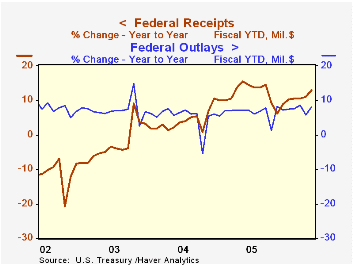 Global| Jun 13 2006
Global| Jun 13 2006U.S. Budget Deficit Deeper
by:Tom Moeller
|in:Economy in Brief
Summary
In May, the U.S. federal government ran a budget deficit of $42.8B that was slightly deeper than the deficit during the same month last year. The FY06 to-date budget deficit nevertheless narrowed to $227.0B versus a deficit of $272.3B [...]

In May, the U.S. federal government ran a budget deficit of $42.8B that was slightly deeper than the deficit during the same month last year. The FY06 to-date budget deficit nevertheless narrowed to $227.0B versus a deficit of $272.3B during the first eight months of FY05.
Growth in net revenues FYTD versus the first eight months of FY05 improved to 12.9%. Individual income tax receipts (44% of total receipts) rose 13.6% FYTD as withheld taxes rose 7.5% and non-withheld taxes surged 21.6%. Corporate income taxes (10% of total receipts) similarly were strong and jumped 25.6% y/y during FY06's first eight months.
The improved job market lifted employment taxes (36% of total receipts) 7.5% y/y and estate & gift taxes surged another 15.7% y/y.
U.S. net outlays rose 8.0% FYTD versus '05. Defense spending (19% of total outlays) rose 7.0% during the first eight months of FY06 versus '05.Medicare spending (12% of total outlays) surged 12.2% while spending on social security (21% of total outlays) remained strong at 5.8%.
Presidential Approval Ratings: How Low Can Bush Go? from the American Enterprise Institute (AEI) can be found here.
| US Government Finance | May | April | Y/Y | FY 2005 | FY 2004 | FY 2003 |
|---|---|---|---|---|---|---|
| Budget Balance | $-42.8B | $118.9B | $-35.4B (5/05) | $-318.3B | $-412.7B | $-377.6B |
| Net Revenues | $192.7B | $315.1B | 26.1% | 14.5% | 5.5% | -3.8% |
| Net Outlays | $235.5B | $196.2B | 25.2% | 7.8% | 6.2% | 7.4% |
Tom Moeller
AuthorMore in Author Profile »Prior to joining Haver Analytics in 2000, Mr. Moeller worked as the Economist at Chancellor Capital Management from 1985 to 1999. There, he developed comprehensive economic forecasts and interpreted economic data for equity and fixed income portfolio managers. Also at Chancellor, Mr. Moeller worked as an equity analyst and was responsible for researching and rating companies in the economically sensitive automobile and housing industries for investment in Chancellor’s equity portfolio. Prior to joining Chancellor, Mr. Moeller was an Economist at Citibank from 1979 to 1984. He also analyzed pricing behavior in the metals industry for the Council on Wage and Price Stability in Washington, D.C. In 1999, Mr. Moeller received the award for most accurate forecast from the Forecasters' Club of New York. From 1990 to 1992 he was President of the New York Association for Business Economists. Mr. Moeller earned an M.B.A. in Finance from Fordham University, where he graduated in 1987. He holds a Bachelor of Arts in Economics from George Washington University.
More Economy in Brief
 Global| Feb 05 2026
Global| Feb 05 2026Charts of the Week: Balanced Policy, Resilient Data and AI Narratives
by:Andrew Cates






